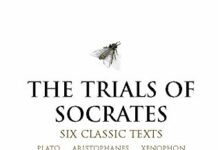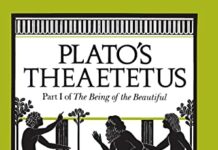
Ebook Info
- Published: 2002
- Number of pages: 169 pages
- Format: PDF
- File Size: 0.78 MB
- Authors: Plato
Description
Some of our greatest blessings come from madnessPhaedrus is widely recognized as one of Plato’s most profound and beautiful works. It takes the form of a dialogue between Socrates and Phaedrus and its ostensible subject is love, especially homoerotic love. Socrates reveals it to be a kind of divine madness that can allow our souls to grow wings and soar to their greatest heights. Then the conversation changes direction and turns to a discussion of rhetoric, which must be based on truth passionately sought, thus allying it tophilosophy. The dialogue closes by denigrating the value of the written word in any context, compared to the living teaching of a Socratic philosopher.The shifts of topic and register have given rise to doubts about the unity of the dialogue, doubts which are addressed in the introduction to this volume. Full explanatory notes also elucidate issues throughout the dialogue that might puzzle a modern reader.ABOUT THE SERIES: For over 100 years Oxford World’s Classics has made available the widest range of literature from around the globe. Each affordable volume reflects Oxford’s commitment to scholarship, providing the most accurate text plus a wealth of other valuable features, including expert introductions by leading authorities, helpful notes to clarify the text, up-to-date bibliographies for further study, and much more.
User’s Reviews
Reviews from Amazon users which were colected at the time this book was published on the website:
⭐Oxford World’s Classics never disappoints with their affordable and high-quality prints. QC on these appears to be higher than comparable options e.g. Penguin Classics. Beautiful cover art and clear, readable text.
⭐The translation is good, but the book has not been digitalized correctly, so the marginal pagination is not rendered as it is meant to be. Good for the casual reader, but unusable for scholar work.
⭐This dialogue starts with Phaedrus reading a speech by Lysias, which without defining “lover” argues that one should have sex with a non-lover rather than a lover. A reader of dialogues like the Gorgias, Euthyphro and Theaetetus would then expect Socrates to ask Phaedrus what love is, and for the rest of the dialogue to be Phaedrus giving definitions (probably starting with a list of examples of love) and Socrates showing that these definitions do not clearly mark off what love is or give us understanding of love. Instead, Socrates gives two speeches, the second of which is his “palinode”, refuting his first speech. The palinode starts, “‘False was the tale’ that you should gratify a non-lover rather than a lover (supposing you have one), just because a lover is mad and a non-lover is sane. If madness were simply an evil, it would be right, but in fact some of our greatest blessings come from madness, when it is granted to us as a divine gift.” Socrates then gives a myth of the soul as a charioteer with two horses. This charioteer has seen something of true beauty in heaven, and seeing beauty on earth reminds it of true beauty. After Socrates’ palinode, the rest of the dialogue is about what the true art of rhetoric would be, and ends with Socrates telling a myth about writing involving “Theuth” and “Thamous”. In this myth Socrates says that writing can be an aide for the memory but cannot teach. “It will atrophy people’s memories. Trust in writing will make them remember things by relying on marks made by others, from outside themselves, not on their own inner resources, and so writing will make the things they have learnt disappear from their minds. Your invention is a potion for jogging the memory, not for remembering.”
⭐_I have heard some call this work a confused jumble of unrelated concepts. These people just didn’t get it. There is one unified theme to the Phaedrus: without a deep connection to the soul and to the higher Reality only accessible to the soul, then all human endeavors are in error._The first part of the dialogue deals with three speeches on the topic of love. This is used only as an example and is not the primary theme (though it is an extremely thorough and compelling examination of the subject.) The first speech (by Lysias) is clearly in error- it is badly composed, badly reasoned, and supports what is clearly the wrong conclusion. The second speech (by Socrates), while an impeccable model of correct rhetoric, and reaching the correct conclusion is also essentially flawed- for it makes no appeal to the deepest fundamental causes of things. Simply put, it lacks soul. The third argument (attributed to Stesichorus) however, delves deeply into the soul. In fact, the core of the argument is centered around the proof of the existence and nature of the soul. That is the consistency here- unless you are Philosopher enough to have looked deeply within your own soul, to have made contact (recollection) with ultimate Reality (Justice, Wisdom, Beauty, Temperance, etc.) then your arguments are just empty words- even if you are accidentally on the correct side._The second part of the dialogue concentrates on showing how true rhetoric is more than “empty rhetoric” (i.e. just clever arguments and tricks used to sway the masses.) True rhetoric is shown to literally be the art of influencing the soul through words. It also reads as the perfect description, and damnation, of modern politics and the legal system. No wonder Socrates was condemned to later take poison- he actually BELIEVED in Justice, Truth, and the Good. As a Philosopher he could not compromise on such things for he knew the profound damage and that it would do to his soul and to his “wings.”
⭐Phaedrus is a great little book or dialogue, it has two main themes, homoerotic love, and rhetoric/writing. The majority of the book is taken up by three speeches, the first is a speech composed by Lysias, and recited by Phaedrus. This speech states that a beloved (or boy) should gratify a non-lover (or someone who is not in love with him) rather than gratify a lover, as a lover is mad etc. The second speech is by Socrates, and follows similar lines. The third speech, is also by Socrates and is a palinode, or a speech or poem which is a recantation of a former opinion. In this speech Socrates praises love, specifically the love between lover and beloved, and states that there are kinds of madness and that some can be beneficial. He describes the soul as composed of three things, likened to a charioteer with two horses. One horse is good the other is bad, the charioteer is rationality or reason and tries to control the horses. The Last section of the book is about rhetoric and writing, mainly that good rhetoric is about knowing the truth of what one is talking about, and in doing so rhetoric becomes closer to philosophy. Surprisingly Plato then disparages writing with a story about the Egyptian god Theuth (who supposedly invented writing) and an Egyptian king, who says that writing will atrophy the memory of his people. The pinnacle of the book is definitely the palinode, as one really gets to understand Platonic Forms. I would highly recommend this book to anyone interested in Classical Greek philosophy, specifically those interested in Platonic Forms.
⭐I haven’t done the comparison with the Greek, but this translation was good as teaching text. Helpful notes.
⭐Book already damaged and bent
⭐simply amazing!
⭐It was the perfect gift for the philosophy-lover in my life. He treasures it in his collection.
Keywords
Free Download Phaedrus (Oxford World’s Classics) 1st Edition in PDF format
Phaedrus (Oxford World’s Classics) 1st Edition PDF Free Download
Download Phaedrus (Oxford World’s Classics) 1st Edition 2002 PDF Free
Phaedrus (Oxford World’s Classics) 1st Edition 2002 PDF Free Download
Download Phaedrus (Oxford World’s Classics) 1st Edition PDF
Free Download Ebook Phaedrus (Oxford World’s Classics) 1st Edition




